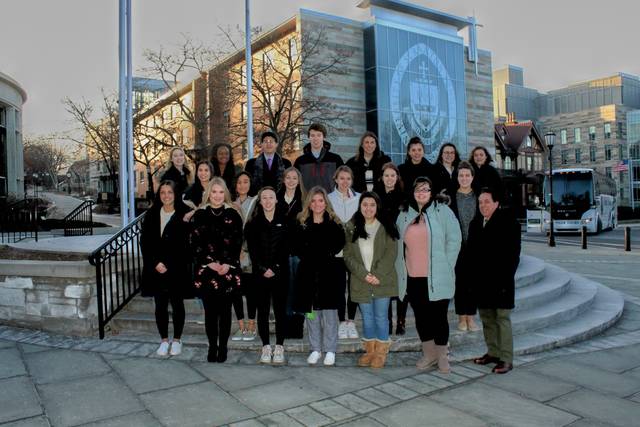CLARKS SUMMIT – Paul Manning spoke as the fluorescent tubes in the ceiling of 420 S. State St. came on and lit the narrow store, illuminating the humming freezers and coolers full of milk and ice cream.
“This was the only avenue that we had where I could have my three sons back in the business,” he said on a recent morning as one of his sons, Brian, checked the ice cream stock. “If I was a normal dairy farmer, I don’t know whether I could even pay him a living wage.”
Paul Manning is the sole proprietor of the Manning Farm Dairy, which sells milk, ice cream and frozen yogurt of its own manufacture from stores in Dunmore, West Scranton, Scranton, Clarks Summit and on the family farm in Dalton.
The Clarks Summit location, in a shopping plaza where its storefront is between a medical lab and a hair salon, is the smallest, oldest and the top sales producer of the four off-farm stores.
Long and slender like the fuselage of an airliner, the store is only 960 square feet – hundreds less than the size of its three sister shops. Beginning next month and continuing through the end of August, warmer temperatures will increase the demand for ice cream here and on some days people will be out the door waiting for their chance to buy some.
“This, just by pure luck, ended up being our best location for a store,” Paul Manning said, “with adequate parking, access and walking distance from school activities.”
Manning’s grandfather, John B. Manning, purchased the dairy farm in Dalton in 1920 but died six years later. His son, Kenneth, ran the operation for 52 years until he died in 1978. The farm’s retail store was opened in 1966.
“It was his idea to have a store,” Paul Manning recalled about this father, “because he liked ice cream and he wanted to be able to just go across the street and get it.”
The Clarks Summit store opened in 1984 after Manning signed a lease with a distant relative who then owned the plaza. The man was hesitant to enter into a commercial relationship, Manning said, because the landlord didn’t want bad feelings within the family if the store failed. But trouble with kinfolk was never an issue, as trade was brisk from the beginning at the new store.
Business has always been good in Clarks Summit, according to Manning, and his three sons – all university graduates – each earn a living solely through the sales of the family’s dairy products. No other goods are carried in the stores.
“People will drive a separate trip to get milk,” Brian Manning said. “Those are the customers that we appreciate the most because they’re going to get their groceries somewhere else where there’s a milk aisle.”
Sales of milk, which comes in regular, 2 percent milkfat and skim varieties, remains constant throughout the year. Ice cream is available always, but production goes up with the average daily temperatures.
During the summer months, about 130 people work, mostly part-time, in the family’s stores. The 145-acre farm, where 100 cows are milked and another 100 are being raised to become producers, is run by Paul Manning and his sons.
Brian Manning, the oldest, acts as the farm manager and makes decisions about crops and feed, while his brother Ken works in production – bottling milk and making the ice cream. The other sibling, Kevin, delivers products to the stores and helps run the farm.
“So, they’re all really busy,” Paul Manning said.
The Mannings believe their dairy products are unlike those typically found in grocery and convenience stores. And manufacturing, not marketing, is what makes theirs different. They use vat pasteurization, in which the milk is heated to 145 degrees and held for 30 minutes.
“It’s not very efficient,” Paul Manning said. “But the bottom line is you preserve a little more of the milk sugars. The milk will taste better.”
Since the Manning Farm Dairy logo is displayed on its containers of ice cream and milk, something done by the big dairy chains, customers have told the Mannings they assumed there were dozens or more of their stores.
Even some longtime patrons were unaware all the Manning dairy products are from local cows that consumed feed grown on area lands and processed and packaged on a Dalton farm by a man and his sons.
“That’s about as vertically integrated as you can get,” Paul Manning said.






